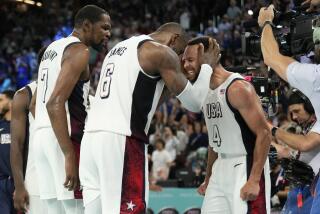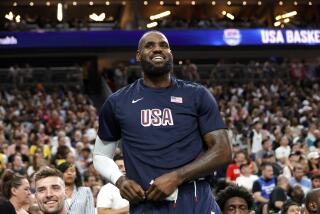U.S. Wrote Book on Basketball, but Rest of the World Has Been Reading
- Share via
SEOUL, South Korea — Two seconds remained before halftime and a very good international basketball team, Yugoslavia, had a sidecourt out-of-bounds against a very bad one, Central African Republic.
Against anyone equally sophisticated, the best the Yugoslavs could have hoped was some sort of low-percentage jump shot. Instead, the guard inbounding the ball took advantage of nobody jumping in his face and threw a lob pass to a teammate, who had run his man into a pick, for an uncontested dunk.
What this illustrates is that Olympic basketball has gotten both much better and much worse. The best countries are good enough for the NBA to crook a finger at their superior players; the terrible countries don’t recognize a pick and roll the fourth time they get slickered.
Overall, the international game has gotten to the point where, at last, players are able to mix at the highest levels. Three Olympiads ago, that would have been considered ludicrous.
A Soviet in the National Basketball Assn? Be serious. Now, the Atlanta Hawks have the rights to two Soviets; the Portland Trail Blazers used a first-round pick for a third, the saddest player at these Games, Arvydas Sabonis.
Once the most gifted amateur player in the world, Sabonis seems slow and disinterested here. Perhaps this is because of that injury Portland officials said was too risky for him to play.
Whatever, Sabonis has been a prodigy for years without the inspirational opposition to make him better. How great can a player become when he is truly tested less than a half-dozen times a year? To one pair of eyes, he has gone from being Bill Walton to Bill Laimbeer.
As far as they’ve come--and the Boston Celtics signing a Yugoslav center is further indication of their high level of play--most of the very good Olympic teams still have a textbook look about them.
The style is as though everybody was issued a Pete Carril how-to book and memorized it, line by line. You can almost see the point guards’ minds flipping the pages as they bring the ball upcourt and set the offense.
“Switch ball from left to right hand . . . bounce pass to forward . . . set pick . . . get ball back and square body to basket . . . release ball at top of jump.”
That’s too simplistic, but not by much. Technically, several of the better international teams are as skilled as the best the colleges offer in the United States. But we often use that as the final resort to maintain our dominance.
Because Americans wrote the textbook, we’re good enough to build on it. Our teen-agers know the fundamentals, then develop their own Ph.D. moves against each other on the playgrounds.
John Thompson has recognized the abilities of foreign teams, identified their limitations and constructed a way to win the Olympic gold. His plan: to see how well the Soviets, the Yugoslavs and Brazilians improvise.
Thompson knows that they have mastered the fundamentals. What, he wonders, would happen if, all of a sudden, somebody tore pages 20 through 33 out of the book? What if foreign players have to react to situations they almost never have faced?
This test comes in the form of pressure defense. Overplaying. Traps and complex switches. Foreign teams very likely shoot better than the Americans; but can they score? And can they think two passes ahead?
The disadvantages for Americans at the Olympics are many. They also are easy to overlook.
“So many things for the American players don’t have to do with the rest of their lives,” said Canadian coach Jack Donohue, the former Holy Cross coach who had Kareem Abdul-Jabbar in high school. “In college, the players are taken care of. It’s different in the Olympic Village--and our guys are used to it.”
To rise another level in basketball, the European countries ought to encourage their players to join American teams whenever possible. Soviets with NBA experience will be better in the Olympics. So instead of Dale Brown trooping about the globe, countries ought to be calling him at LSU.
Just now, the Yugoslavs and Soviets are what the Big East would be like if its players had nowhere else to go. Spain, Australia and some others are mid-level Atlantic 10; China, Central African Republic and the rest are high school teams whose players shave more than once a week.
And then we come to Brazil, wild and wonderful, the one country that cannot be fitted into a convenient mold. Or maybe Doug Moe has been secretly shipping training films to Rio for the past dozen years.
The United States is almost always going to be the basketball heavy at the Olympics, the sober-faced and palm-sweating giant whose fans assume victory before tipoff and get surly after squeakers.
More to Read
Go beyond the scoreboard
Get the latest on L.A.'s teams in the daily Sports Report newsletter.
You may occasionally receive promotional content from the Los Angeles Times.






